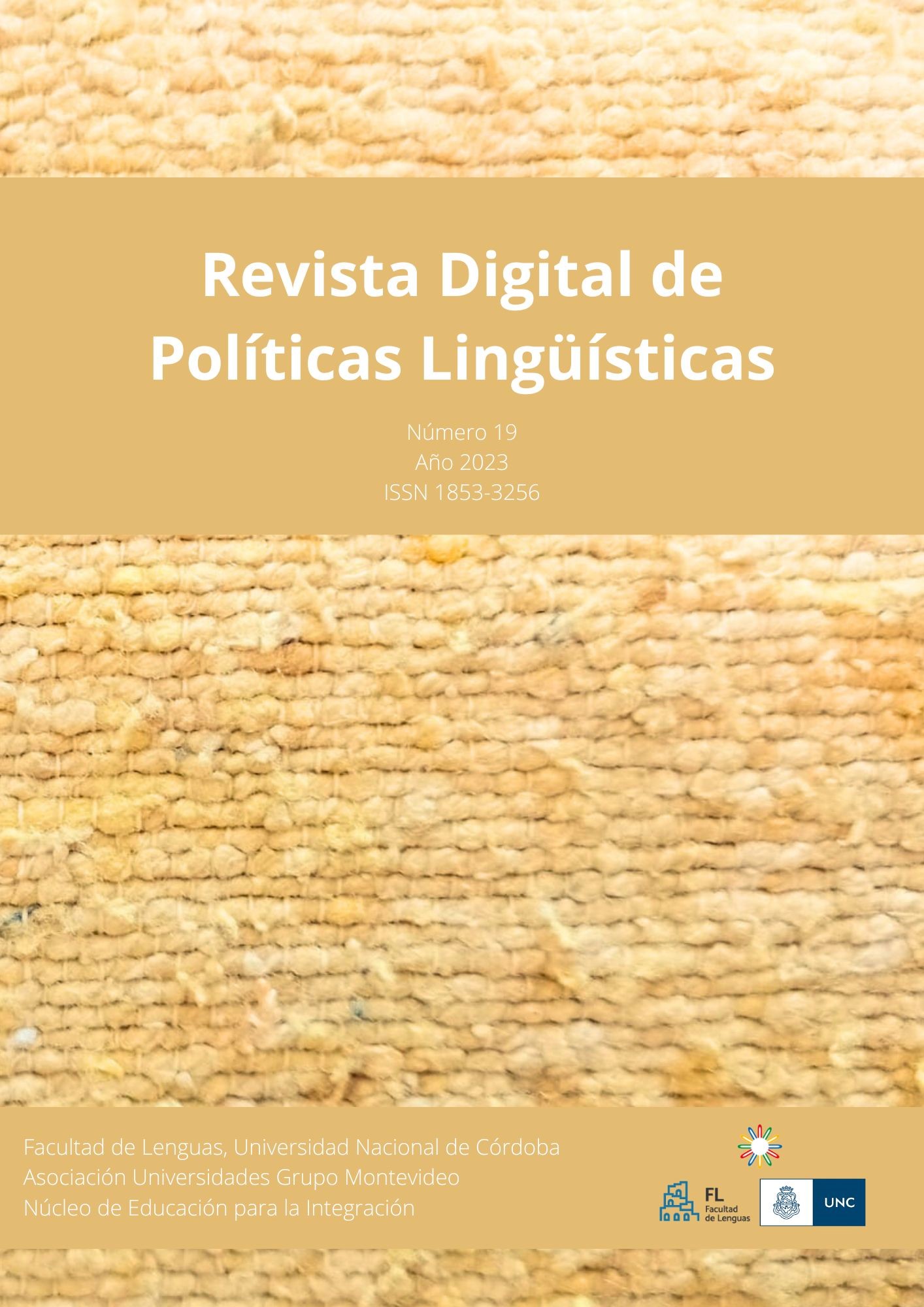ONLINE MACHINE TRANSLATORS IN TEACHING ENGLISH FOR SPECIFIC PURPOSES
Keywords:
online machine translation, English for Specific Purposes, digital tools, teachers resistanceAbstract
English for Specific Purposes (ESP) focused on reading comprehension has been the L2 teaching approach chosen by the Faculty of Biochemistry and Biological Sciences of Universidad Nacional del Litoral and the Faculty of Economic Sciences of Universidad Nacional de Entre Ríos. In recent years, technological tools such as online machine translators have had a considerable impact on this approach but their use in the classroom continues to be resisted by teachers in general. As professionals in the field of English as a Foreign Language (EFL) teaching, we propose in this paper to reflect on this reality that has challenged us and, on the need to adapt our teaching practice to the current use our students make of online machine translators.
Downloads
References
Basturkmen, H. (2010). Developing Courses in English for Specific Purposes. Palgrave Macmillan.
Belcher, D. & Lukkarila, L. (2011), Identity in the ESP context: Putting the learner front and center in needs analysis. In D. Belcher, A. M. Johns, & B. Paltridge (Eds.), New Directions in English for Specific Purposes Research (pp. 73-93). University of Michigan Press.
Briva-Iglesias, V. (2021). Traducción humana vs. traducción automática: análisis contrastivo e implicaciones para la aplicación de la traducción automática en traducción jurídica. Mutatis Mutandis. Revista Latinoamericana de Traducción, 14(2), 571-600.
Cassany, D. (2016). Recursos lingüísticos en línea: Contextos, prácticas y retos. Revista Signos, 49, 7-29.
Caballero Rodríguez, B. (2010). El papel de la traducción en la enseñanza del español. In: El currículo de E/LE en Asia-Pacífico. Instituto Cervantes.
Conde Noguerol, M. E. (2017). El uso del traductor Google Translate en una clase de Español para Extranjeros. In Edunovatic 2017. Conference proceedings: 2nd Virtual International Conference on Education, Innovation, and ICT. 12-14. AdayaPress.
Clerici C. (2021). Manual para leer textos en ingles sin saber mucho inglés. EDUNER.
Córica, J. L. (2020). Resistencia docente al cambio: caracterización y estrategias para un problema no resuelto. RIED. Revista Iberoamericana de Educación a Distancia, 23(2), 255-272.
de Miguel Arnaiz, J. L. (1999). Características de los textos, conocimientos previos y comprensión lectora. Revista de Psicodidáctica, 8, 55-72.
Dominguez, M. B., Laurenti, L., & Aguirre Céliz, C. (2013). Google Translate: una experiencia con alumnos de inglés técnico en el nivel superior. Virtualidad, Educación y Ciencia, 4(6), 44-53.
Dudley-Evans, T. & St. John, M. J. (1998). Developments in English for specific purposes: A multidisciplinary approach. Cambridge University Press.
Grabe W. & Stoller F. L. (2002). Teaching and Researching Reading. Pearson Education.
Flowerdew, L. (2013). Needs analysis and curriculum development in ESP. In B. Paltridge & S. Starfield (Eds.), The handbook of English for specific purposes (pp. 95-113). Wiley Blackwell.
Freeman, D. & Freeman, Y. (2008). Enseñanza de lenguas a través de contenido académico. Revista Educación y Pedagogía, XX(51), 97-110.
Hyland, K. (2022). English for Specific Purposes: What is it and where is it taking us? ESP Today, 10(2), 202-220.
Hutchinson, T. & Waters, A. (1987). English for specific purposes: A learning-centered approach. Cambridge University Press.
Kim, H. S., & Cha, Y. (2023). The Role of AI Translators on Reading Comprehension. Korean Journal of English Language and Linguistics, 23, 38-58.
Lee, S. M. (2023). The effectiveness of machine translation in foreign language education: a systematic review and meta-analysis. Computer Assisted Language Learning, 36(1-2), 103-125. https://doi.org/10.1080/09588221.2021.1901745
Maggio, M. (2018). Habilidades del siglo XXI: cuando el futuro es hoy: documento básico. XIII Foro Latinoamericano de Educación. Santillana.
Martínez-Carrasco, R. (2022). “Más bellas y más infieles que nunca”. Usos y percepciones sobre la traducción automática entre el profesorado de traducción jurídica de España. Quaderns de filología. Estudis lingüístics, 27, 235-257.
Ministerio de Educación, Cultura, Ciencia y Tecnología. (2018). Argentina en PISA 2018. Informe de resultados. https://www.argentina.gob.ar/sites/default/files/2022/07/resultados_pisa_2018_-_informe_nacional_-_argentina.pdf
Morancho, V. I. & Rodríguez Mantilla, J. M. (2020). Pensamiento Crítico: conceptualización y relevancia en el seno de la educación superior. Revista de la educación superior, 49, 9-25. https://doi.org/10.36857/resu.2020.194.1121
Widdowson, H. (1979). Explorations in Applied Linguistics. Oxford University Press.
Downloads
Published
Issue
Section
License

This work is licensed under a Creative Commons Attribution-NonCommercial-NoDerivatives 4.0 International License.
Aquellos/as autores/as que tengan publicaciones con esta revista, aceptan los términos siguientes:
- Los/as autores/as conservarán sus derechos de autor y garantizarán a la revista el derecho de primera publicación de su obra, el cual estará simultáneamente sujeto a la Licencia de reconocimiento de Creative Commons que permite a terceros compartir la obra siempre que se indique su autor y su primera publicación esta revista.
- La cesión de derechos no exclusivos implica que la publicación de los artículos en la presente revista no quita la posibilidad o el derecho al autor de publicar de manera posterior a otras revistas u órganos editoriales y la autorización por parte de los autores para que el trabajo sea depositado en los repositorio institucionales: Portal de Revistas de la Universidad Nacional de Córdoba.



